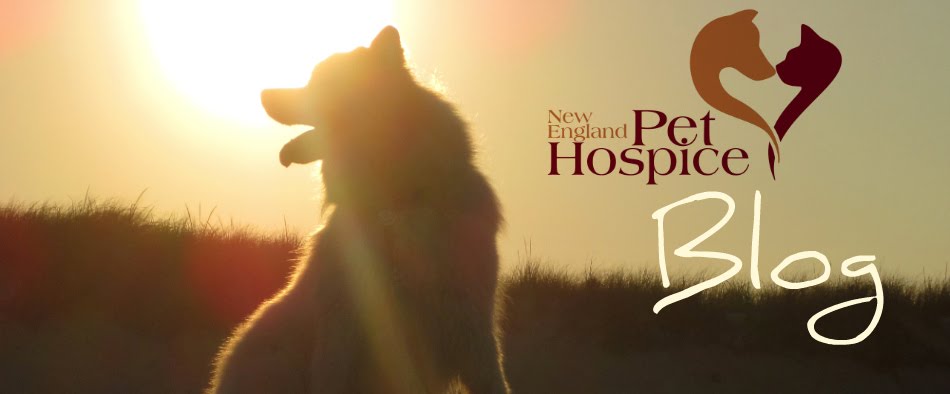 At New England Pet Hospice, we care for elderly and special needs animals as well as those who have a terminal diagnosis. This is one of the few areas we differ from the human hospice model. In human hospice, the patient must be diagnosed with a terminal illness with less than 6 months to live (some hospices accept patients with a 12 month prognosis).
At New England Pet Hospice, we care for elderly and special needs animals as well as those who have a terminal diagnosis. This is one of the few areas we differ from the human hospice model. In human hospice, the patient must be diagnosed with a terminal illness with less than 6 months to live (some hospices accept patients with a 12 month prognosis).Why the different standard?
Because of euthanasia. It is widely accepted that the vast majority of pets in our country will be put to sleep (except for those who die of traumatic injury). This has a direct impact on our elderly and special needs animals in many ways, but especially in three ways:
1. Quality of Life. The Quality of Life scales used to judge when a terminally ill animal is ready for euthanasia are equally applied to our animals who are elderly or have special needs. And all of our elderly and special needs animals will "fail" that test at some point (or points) in their life, almost always within a year and often within a few months. While some families may have the knowledge and muster the strength to carry on without support, many - or perhaps even most - will not.
2. Practical Care. At the practical level, if the family cannot or does not feel they can provide the proper care for the elderly or special needs animal, the animal will likely be euthanized. There are key junctures when attentive, in-home support can be critical to preserving the animal's well-being. Often this arises if the animal faces mobility issues, develops incontinence, or has eating or drinking difficulties. The family may solve mobility issues with a wheelchair, for example, but when the animal is leaking urine and defecating around the house, it may be (or seem like) too much to manage.
As a hospice, we manage mobility, incontinence, and nutrition issues every day. We know the tips, tricks and equipment that can turn an overwhelming situation into a manageable one. Euthanizing an animal due to practical care concerns may end the animal's life prematurely and is brutal on the family who are often overwhelmed by feelings of guilt, regret and incompetence. Learning after the animal passes that if only they had known about x, y or z, their animal may have been able to live longer only exacerbates these feelings.
There are certainly times when practical care simply is impossible, but it is not often and even then at least with hospice care the family and animal know we have exhausted all possible options and there are professional caretakers to assure the family that they did all they could.
3. Societal Pressure. "Granny really is showing her age. She's had a good life, don't you think it is time to let her go? Why are you being so selfish to force her to keep living?"
As a society, our attitude toward our elder citizens is not good, but even so, there isn't societal pressure to end a life when the person reaches their senior years. The fact that Massachusetts recently failed to pass the Right to Die Act underscores this.
But it's OK, and in fact the norm, that when an animal gets older, our society tells the pet parent it is their moral obligation to euthanize the animal.
Similarly, we don't treat our human citizens with special needs very well in our culture, but we also don't assume that their life isn't worth living as we do with animals. Famous advocates like Helen Keller, Christopher Reeve, Matthew Sanford, Marla Runyan, Michael J. Fox, and Stephen Hawking to name a (very) few show us how little disability matters. According to the 2000 census, 19% of Americans over the age of 5 have a disability -- that's equal to 49.7 million people or 1 in 5 Americans -- and half of these have a severe disability. These individuals make important, significant and valuable contributions to our society. Can we imagine that our special needs animals do also?
We are in awe of the technology that allows amputees to run like the wind, computerized exo-skeletons that promise new mobility for those who are paralyzed and cochlear implants that allow the deaf to hear. Yet we are stunned and incredulous when we see a dog in a very low tech but life changing wheelchair. We question whether it is a waste of money, fair to the animal, and an owner "going overboard."
The clear message from those around us is that our elderly and special needs animals deserve to die, are not worthy of our time and resources and serve only our own selfish needs.
Nothing could be further from the truth but from the perspective of those around us, even those closest to us, our elderly or special needs animal may as well have a brutal and aggressive form of cancer. The pressure to euthanize is often at the same level.
In a recent survey of New England Pet Hospice clients who had an animal pass in the last two years, we heard over an over again that clients were so relieved to hear us say they weren't crazy for not wanting to euthanize their animal immediately and that the additional time they had with their animal (whether the animal ultimately died naturally or by euthanasia) was a gift they will always treasure.
We love your animal for who they are and wherever they are on their unique journey in this world. And until aging and special needs are no longer imminently terminal conditions for our beloved animals, we at New England Pet Hospice will care for them lovingly.


this is such a great and informative article. My dog is currently undergoing treatment for lymphoma. It can be hard work and an emotional roller coaster. However, he is still comfortable, living pain free and enjoying walks and ball play. I will care for him as long as needed.
ReplyDeletethank you for sharing this and reminding me that I am not crazy or selfish for doing this.
~ gretchen and Ernie
Gretchen,
DeleteI hope you and Ernie has a nice holiday and that he is doing well. Keep us posted! Our hearts and thoughts are with you both.
Best wishes,
Heather
Founder and Director
New England Pet Hospice & Home Care
greeting! thanks for the sharing your content and its useful for every person.
ReplyDeleteA nice & informative article. It will help almost every person who have a pet. Thanks for sharing and hope we will see again this type of informative post.
ReplyDeletenew vitality